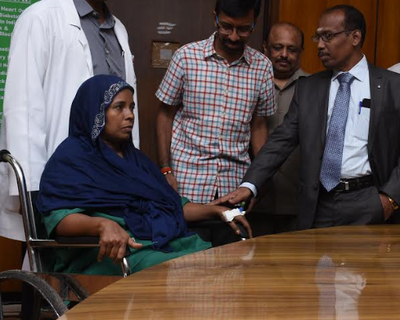People with O+ blood should check if they fall into ‘rare’ group: Doctors
 Mehenoor Jain, mother of three was unaware that she had the rare ‘HH negative blood group’, which is also known as the Bombay blood group. It took more than 36 hours for the surgeons in Government Stanley Medical College and Hospital to source out a “rare” blood group to repair the blood vessels on the limbs of a 46-year-old housewife from Kumbakonam. But the blood starved-muscles gave up leading to gangrene and she had her left leg amputated.
Mehenoor Jain, mother of three was unaware that she had the rare ‘HH negative blood group’, which is also known as the Bombay blood group. It took more than 36 hours for the surgeons in Government Stanley Medical College and Hospital to source out a “rare” blood group to repair the blood vessels on the limbs of a 46-year-old housewife from Kumbakonam. But the blood starved-muscles gave up leading to gangrene and she had her left leg amputated.
“We now want to tell people that only thing could have saved her is awareness. Now we want that, people with O+ blood should test themselves for the rare group,” Dr Ponnambala Namasivayam, the hospital dean said.
When she was referred to the hospital earlier this month with a lack of sensation on her left leg after a surgery to correct her dislocated knee, doctors said she might require immediate surgery. But her haemoglobin level in blood was 5.2g/dl (grams per deciliter), against the normal range of 12.0 to 15.5g/dl. So the doctors decided to transfuse some blood before surgery. But minutes after the transfusion begun, she began to face side effects. Further, tests revealed that the patient had a rare HH blood group. “Since it is a very rare group, blood banks don’t stock up the blood. So, these surgeries are usually planned ahead. So, these surgeries are usually planned ahead. We have a list of donors and we mobilise them. Had Jhan known her condition earlier, we would have had time to save her leg,” said Dr N Rajakumar, hospital’s professor and head of transfusion medicine.
In a couple of days, four donors volunteered and the patient was transfused blood and taken up for surgery and the doctors amputated her leg. “It may take some time for surgical wounds to heal. We are planning an artificial limb along with rehabilitation therapy soon,” said Dr Namasivayam.
The HH blood group is very rare among all the other blood groups. In ‘A’ group, the person has A antigen and B antibody. While those with AB have both the antigens and no antibodies, people with O group have only antibodies. In all these groups, there is another antigen called H. Those with Bombay group have all the three antibodies and none of the three antigens. Dr Rajakumar said awareness about Bombay blood group is poor making emergency situations tricky. “Men and women with O positive group must get themselves checked and if they are of the rare group, they must be encouraged to register for donations,” he said.
According to the medical literature, four in 10 lakh people across the globe have the HH blood group. In Tamil Nadu itself, they’ve managed to collect contacts of 50 people, who can donate blood during emergencies.
Source: https://timesofindia.indiatimes.com/city/chennai/people-with-o-blood-should-check-if-they-fall-into-rare-group-doctors-say/articleshow/66432200.cms